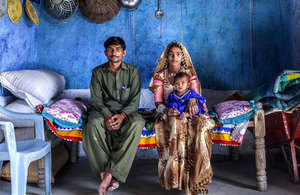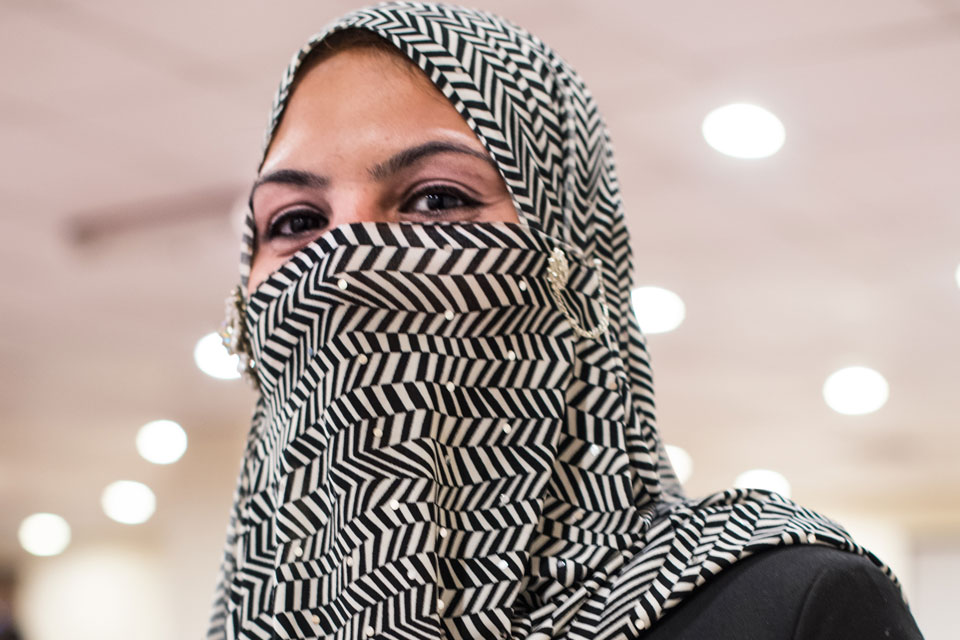Leading the way: first female prosecutor in Khyber Pakhtunkhwa fights for women’s rights
UK aid to Khyber Pakhtunkhwa is helping the province be more ‘female-friendly’ and support women to come forward and fight for justice on crimes committed against them.

Violence against women is widespread in Pakistan - nine out of 10 women have experienced domestic violence, but only 4% of complaints received by the police are from women. Picture: Shiho Fukada/IRC/Panos
Thirty-year-old Haseena Syed is a pioneer in supporting justice for women in her region. She is the first female prosecutor in the Khyber Pakhtunkhwa Prosecution Service (KPPS) in Pakistan. Through the work Haseena has done, she has been able to convince a number of women who are victims of domestic abuse to come forward and fight for justice.
Pakistan is ranked as the third most dangerous place in the world for women, and one of the most unequal. Violence against women is widespread, be it domestic violence, sexual abuse and harassment, acid attacks, forced marriages, rape and honour killings. Nine out of 10 women have experienced domestic violence, but only 4% of complaints received by the police are from women.
Women find it easier to speak to another woman. For instance a girl was regularly beaten up by her husband, who eventually threw acid on him. I met her a couple of times to explain the legal aspects of what had happened to her and that she could get justice. It took a while, but once I gained her trust and with her family’s support, she came forward with her story and the case went to trial. The husband was eventually convicted and sentenced to 7 years in prison.

Haseena Syed is the first female prosecutor in the Khyber Pakhtunkhwa Prosecution Service (KPPS) in Pakistan. Picture: Aitebaar
Facing up to the opposition
Haseena belongs to a conservative family and is the first female from the household to take up a job. It was not easy convincing her family to allow her to study law. Her brother was very supportive and took it upon himself to convince their father. He also took responsibility for accompanying Haseena to and from college to allow her to complete her degree. After completing her education, she applied and was accepted into the Khyber Pakhtunkhwa Prosecution service.
I was the first female prosecutor in the Peshawar center (out of 150 male prosecutors). It is a difficult job for anyone in this society, and is particularly difficult for women. I was faced with a lot of opposition from home. It was only after the first year that my father began to realise how much this mattered to me. He saw how dedicated I was to my profession and began to show more support. I am proud to say that I am now the primary bread winner for my family.
The UK is supporting the Khyber Pakhtunkhwa government strengthen security and justice services by helping the police and prosecution service carry out their role better. There is a special focus on assisting the police to become more responsive to women’s needs. One aspect of the UK’s support focuses on helping prosecutors perform their role more effectively through training programmes.
I have recently benefited from several prosecutorial trainings. These trainings helped provide essential skills and techniques – such as advocacy skills, improving understanding of legal knowledge and ethical obligations. The trainings have also empowered me with better communication skills.The trainings taught me how to effectively structure my arguments and also how to better work with my senior colleagues. I now routinely apply what I learned in those trainings in my work.
Changing perceptions
While her hard work was enough to convince her family, it did little to change the opinion of her colleagues.
My acceptance at work was mixed. I was warmly accepted by my male prosecutorial colleagues but some senior male lawyers did not accept me in the beginning, owing to me being a female. Acceptance came slowly after a couple of years. I became more confident with time and learned how to handle antagonism and criticism and focused on my work without being deterred.
Although Haseena found it difficult initially, she thinks the perception of working women in the province is changing. She believes women can contribute positively to society and need to be made aware of their fundamental rights, which can only be achieved through education.
Facts and stats
- Three model police stations in Peshawar district have been opened which undertake more complex investigations, and use community and gender responsive policing techniques. A further 4 model stations are in the pipeline.
- 44,800 people (30% women) are able to access better services through the model police stations.
- ‘Lady Complaints Units’ established in 3 model stations, enabling more women to access justice. The results show an increase of 67% in number of women coming forward to register their complaints.
- Through the Alternate Dispute Resolution work, 201 cases are being mediated as of October 2014, and the number of cases will rise up to 500 before the end of 2014, which saves a significant number of days of court proceedings.
- Completion of the largest ever rule of law perceptions survey in the province (28,000 participants).
- Completion of the first ever pre-service training for the Prosecution Service which ensures the proper induction of officials selected for the prosecution service.
- Completion of a Prison Census, which identified and will provide legal assistance to women and juvenile prisoners that may be eligible for bail or parole.